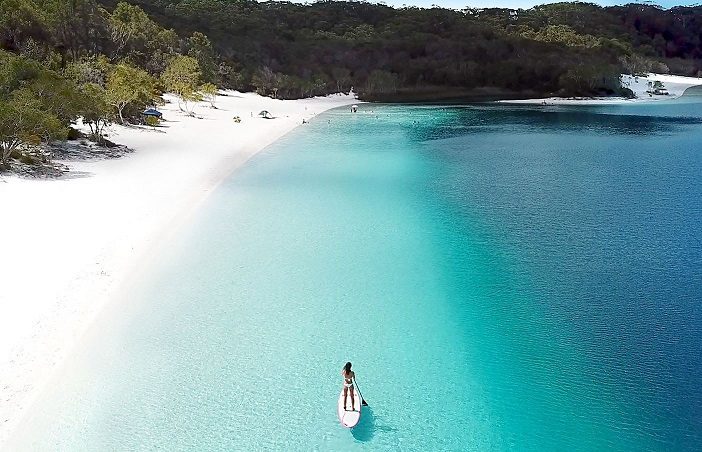 In a move marked by reverence for indigenous culture and heritage, Queensland’s Government has announced the historic reversion of Fraser Island’s name to its original moniker, ‘K’gari.’ This formal recognition, in essence, reestablishes the island’s deep-rooted connection with the Butchulla People, its original inhabitants, and their rich creation narrative that has been passed down for millennia.
In a move marked by reverence for indigenous culture and heritage, Queensland’s Government has announced the historic reversion of Fraser Island’s name to its original moniker, ‘K’gari.’ This formal recognition, in essence, reestablishes the island’s deep-rooted connection with the Butchulla People, its original inhabitants, and their rich creation narrative that has been passed down for millennia.
The momentous announcement echoes throughout the lakes, waterways, coastlines, skies, and lush rainforests that have been integral components of the traditional Butchulla culture. The natural People nurtured and venerated these Butchulla treasures for an estimated 20,000 years, leading to an inherent harmony with the land, sea, and living beings on K’gari.
In 1992, UNESCO acknowledged K’gari as a World Heritage Area, celebrating its unique geographical formation spanning over 750,000 years. Today, it stands as the largest sand island globally, a testament to the remarkable natural processes that continue to shape our planet.
Dr Rose Barrowcliffe, a Butchulla Woman and Post Doctoral Research Fellow, shared the profound significance of this name change, stating, “By respecting Indigenous place names, we are respecting Indigenous culture.” Australia, home to the oldest continuously living cultures globally, brings a unique cultural dimension. “By honouring Indigenous cultures and using place names, we are raising up the culture and saying we are proud of it,” she added.
Located approximately 300km north of Queensland’s capital, Brisbane, K’gari has always been a beacon for domestic and international tourists. Last year alone, over 800,000 visitors journeyed to the Fraser Coast, setting a record for interstate visitors from across Australia.
Patricia O’Callaghan, Tourism and Events Queensland CEO, lauded K’gari’s breathtaking beauty and compelling ancient stories. She recognized the reclamation of the island’s original name as a crucial chapter in its history, a testament to Queensland’s unique fusion of two ancient cultures co-existing harmoniously.
“Visitors to K’gari are spoiled for beautiful scenery but most importantly they can embrace the culture of the Butchulla People who have called the island home for tens of thousands of years,” O’Callaghan said.
Aunty Joyce Bonner, Butchulla Aboriginal Corporation Language and Cultural Coordinator defined K’gari as “home,” encompassing her people’s descendants, ancestors, and traditional owners. She clarified the pronunciation of K’gari, emphasizing the silent ‘K’, as in ‘know.’
K’gari’s ethos is encapsulated in the three lores observed by the Butchulla People, guiding locals and visitors alike in their interactions with the island. These encompass respect for the country and its natural elements, a prohibition against taking anything from the land, and an encouragement to share when in abundance.
Recognized as part of the Great Sandy Biosphere by UNESCO in 2009, K’gari’s natural splendour is undeniably breathtaking. With no roads, visitors navigate through sand tracks and waterways, exploring the island’s numerous natural wonders. These include the crystal-clear freshwater of Boorangoora (Lake McKenzie), the world’s largest perched lake, Lake Boomanjin, and the iconic Champagne Rock Pools. Moreover, K’gari holds the unique distinction of being the only known place where rainforest grows on a sand island.
To explore more of K’gari’s splendours and start planning your adventure, visit queensland.com.
Written by: Jill Walsh
















